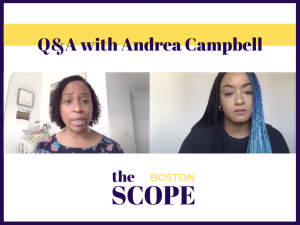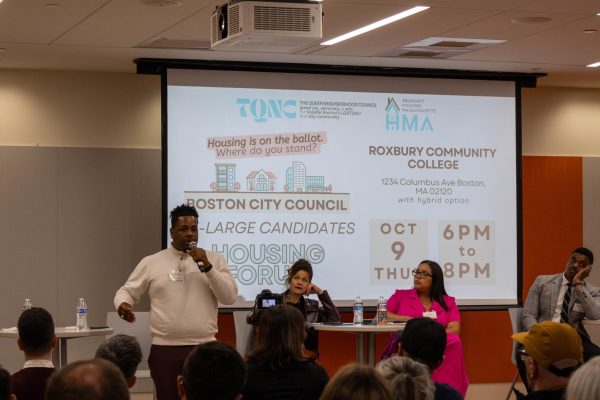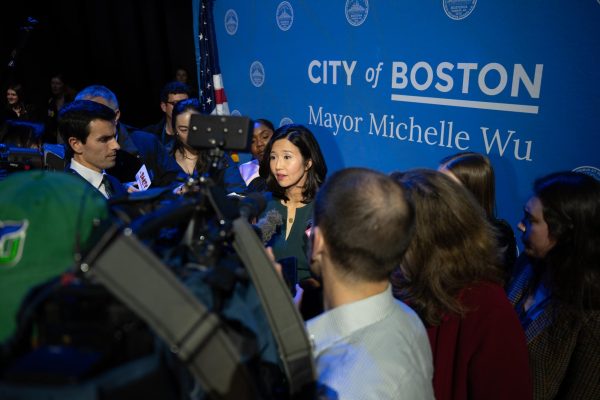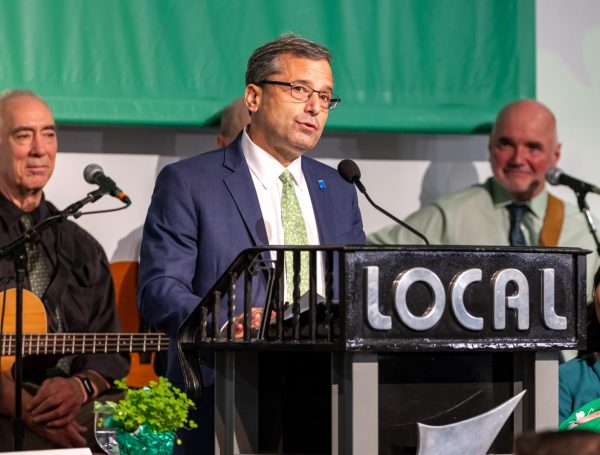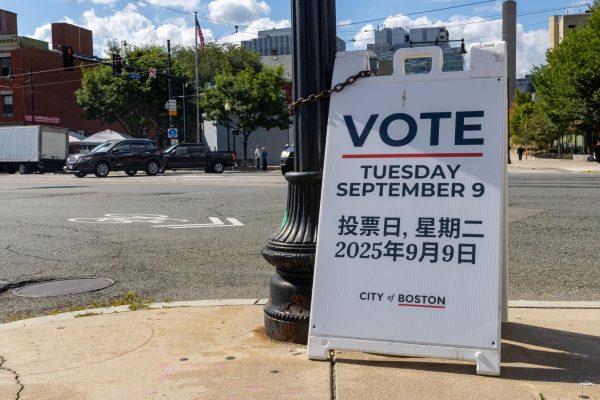City council race: Joel Richards running for District 4
Joel Richards, a Boston elementary school teacher, is running for Boston City Council to represent District 4, an area that includes parts of Jamaica Plain, Dorchester, Mattapan and Roslindale. Andrea Campbell currently represents District 4, but is running for mayor in this year’s election.
Richards is running against at least 10 other candidates including Jacob Urena, Deeqo Jibril, Nikkia Jean-Charles, Brian Worrell, Josette Williams, William Dickerson, Trevour Smith, Leonard Lee, Troy Smith and Trina Ruffin for the District 4 seat.
Richards teaches technology to kindergarten through fifth grade at Blackstone Elementary School in the South End. He has been a teacher for the past 14 years, and lived in Boston for the past 12. Richards is also the chair of Fields Corner Main Streets, a small business association in Dorchester that is part of the Boston Main Streets Foundation.
Richards lives in Dorchester with his wife and two sons.
The Scope recently spoke with Richards about top issues for his campaign and what he plans to accomplish if elected. The following conversation has been edited for length and clarity.
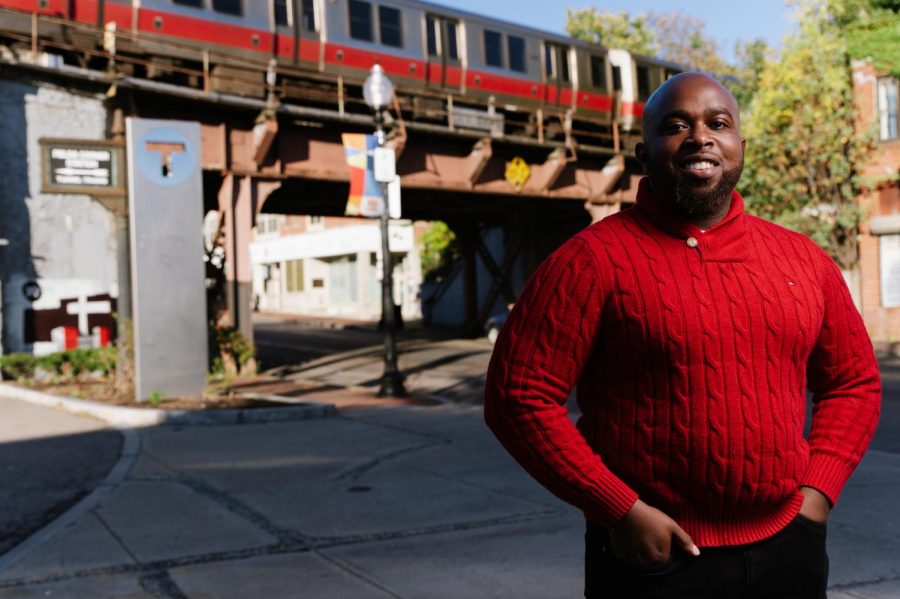
Why did you decide to run?
That’s like, my favorite question. The policy stuff is great, and I’m developing that. But this is a question of like, I decided to run because of who I am in the community and how I see things. So as a teacher, education is the backbone of a community, in my opinion. It’s a safe haven for kids, where kids can really explore themselves and become better people. And the main reason I ran is that not every child in Boston has that experience. They don’t get the chance to really flourish, or really learn or pursue their interests, because schools are either underfunded or overcrowded.
And I also see community as a place where people are investing in themselves, and deserve a type of return on that. So that comes in the shape of housing. I feel like a lot of people that have lived in Boston for a long time are now getting priced out and gentrified out. I don’t want Boston to be just people who have been here a long time, or a Boston that’s too expensive for families to afford. I want a Boston that’s family centered. And you do that by public housing, not just affordable to rent, but also affordable to purchase.
This works great, because the next question I was going to ask you is what are the top issues for your campaign?
Right — I’ll go back so it’s a little more clear. I mean, my top three issues are why I’m running. It’s because I’m an educator. It’s because I bought a house in Boston and I’ve also struggled with having to refinance, when I could no longer afford the house that I live in, and getting priced out. And navigating that while everything’s getting more expensive. So I understand that. And I’m also a landlord, so I also understand what other small landlords and small business owners are going through in Boston right now. So my main three reasons are education, housing and small business. That’s my main platform, and also why I’m running.
How would you do things differently than the incumbent city councilor [Andrea Campbell], for District 4?
I feel like when it comes to me, personally, there’s a kind of disparity or difference in some city counselors, where they’re very pragmatic, or career politicians. They know how to work bureaucracy. And then there’s sometimes a lot of activists, people that want to do things for the community. They really want to be community centered, and have community conversations, and bring community together. The only thing I’d say I’d do differently is that I want to bridge the gap from being a community activist — which is like bringing community together, making them realize that their community cares about them, helping them self actualize. And I also want to be that pragmatic, policy-making person that brings funds to the community, that brings projects, and economic activity to the community through policy.
On your campaign website, you said you want to “be proactive” about the city budget, and you “no longer want to fight for reallocation, but allocation of funds” in Boston schools. Could you tell me more of what you mean by that?
So I don’t like the term “reallocation.” And I feel like it gets used a lot when it comes to District 4 and other communities of color. It’s like, “Well, we need to reallocate from this.” But I feel like it’s money that should have always been there. So I would rather talk about allocation: What do District 4 schools want and need? Right? What do they need to be a top school? I want to allocate that money there, not reallocate it there or fight for a special grant. That money should be there because these are valued members of the community.
So when I say I want to be proactive: I feel like a lot of the time, we come after the budget has been written to advocate for what we want. I want to gather the community together before the budget is written. I want to unify groups, get District 4 together, get the activists together and advocate for the budget before it’s written. Usually the mayor sends the budget to the city council and then the city council either rejects it or approves it, so I want to be proactive before that, and talking to the mayor, having meetings.
What are the biggest changes you’d want to see in Boston Public Schools?
The biggest change would be equity in funding. That’s the biggest thing. I want all schools to have the same resources. I want all schools to have the same student-to-adult ratio. And tied to that — it has to be tied — is an elected school board. A meaningfully elected school board, one that is beholden to the people they represent.
You’ve advocated for “Counselors, not Cops,” [an initiative that aims to reduce the criminalization of students and increase support systems like counseling]. How would you approach policing and accountability in the city more generally?
When it comes to policing in Boston, what I’d advocate for is for a community approach where the people of Boston appreciate the police. … It doesn’t make sense to have where the two groups that are supposed to be working together, are unappreciative of each other.
Who do you mean when you say two groups?
The people and the civil servants, the police, that are supposed to serve them. We want to move to a community model where the people that the police are serving appreciate them, and then the police themselves actually appreciate the communities that they’re in. And what that looks like has to be designed by the community itself — so holding forums, where communities actually design when they want in policing, and in public service. Because the job of a civil servant is to uphold civility, right? And then if the civilians you are serving want change, then you have to listen, and change.
Housing affordability is also a big issue here in Boston. How do you plan to address that?
This is one of those projects where I think it will take various housing policies, but there are groups out here doing research now, and we as Boston city councillors need to work with and listen to and develop policy based on the research they’ve already done. We need to provide not just affordable rentals, like I was saying before, but we also have to provide lottery systems where they’re affordable for purchase. One thing I really want to work on is developing policy for is to incentivize developers to develop single family or family-based housing, where the condos or the housing is big enough. Right now it’s incredibly profitable to build a bunch of condos that aren’t suitable for families. We need to work on a policy within the city for developers to be incentivized to build family housing for purchase.
Support for small businesses is a big part of your platform? Could you tell me more about how you plan to support them?
I feel like if COVID has shown us anything, it’s that Boston has the capital and the ability to be creative in supporting small business. COVID hit, and the businesses were slowing down, and there were grants opened up and streets were being shut down. I really feel like one of the ways I want to support small businesses is by providing them the capital to not just survive, but thrive, and improve their business. A lot of these small businesses, in District 4 especially, are from people who look like me, have a similar story to me, and also have been here a long time and have been the backbone of our community. So I really think small businesses are a way for a community to reinvest in itself.
When we’re talking capital from the city, do you have any more on what that could look like? Do you have something specific, like grants, in mind?
I’m working now, doing community listening sessions, but also meeting with housing policy experts to really develop this out.
So while we’ve been talking, a couple of times you’ve talked about bringing different interest groups and community groups and activists in the city together to tackle some of these challenges. How do you see, within your district and within the city, these different groups of people moving toward more unified solutions?
Community groups are all about the community. And I want Boston to be all about the community, and especially, most of these groups are about people in the margins. This is an election for those people. My campaign is a campaign for those people… Like I want to do the marches, and I want to bring the community in and bring light to what’s going on. But I also want to spend a lot of time with policy experts writing and developing policies to bring about change. So I feel like once they know that community groups are involved in real change, that they’re involved in actual writing of policy that could change Boston forever, I feel like they’ll definitely want to come around.




